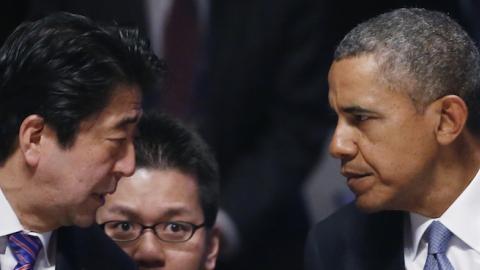A number of Japanese friends and acquaintances, including some high in government, ask: Do you think Donald Trump has a chance to become president? And if he does, they want to know, will it signal a new and potentially disastrous shift in U.S. policy toward Japan?
A recent Reuters poll indicates that most Japanese business executives think so. The Reuters Corporate Survey conducted April 1-15 of 510 big and midsize companies found that 55% believed that a Trump administration would be bad for business in the U.S., and 78% think it would result in a deteriorating security environment for Japan, if U.S. commitments to Japan's defense were suddenly up in the air. "It is very easy to imagine China taking advantage of [a Trump presidency] to step up military operations in the region," wrote one manager of an electronics company.
Not a single company said the security environment would improve under Trump. This is not surprising given the statements the Republican front-runner has made. Trump has said he might withdraw U.S. troops from Japan unless it pays more to maintain U.S. bases and personnel in the country. He has accused Japan of stealing U.S. jobs and even said Japan might have to possess its own nuclear weapons as the U.S. reconsiders the costs of its strategic commitments to Japan and the rest of Asia.
But what observers in Japan may not realize is that Trump's statements are not only inaccurate and out of date, but also do not reflect most Americans' views of Japan these days -- or the reality that America needs a strong and prosperous Japan almost as much as Japan needs a strong and prosperous America.
Sea change
In the last decade, Pew Research Center polls consistently show that two out of three Americans have a favorable view of Japan, and according to a 2010 survey, three in five wanted to increase trade with Japan. By contrast, four in ten Americans see China as their leading economic challenger, and nearly half want Washington to be tougher with Beijing on economic matters.
That's a big change from the 1980s, when American views of Japan were largely negative -- reflecting a fear of Japan Inc. that is found in Trump's overblown and outdated rhetoric. So what's happened to change Americans' views?
First, the rise of Japan as a good corporate steward here in the U.S. Instead of the fearsome economic predators of 1980s myth, Japanese companies like Honda, Nissan and Toyota have opened auto plants in the U.S. that created more than 1.3 million jobs by 2013. They are also innovative partners in new manufacturing areas, such as robotics.
Second has been the alarming rise of China as an aggressive economic and strategic challenge. Many who used to worry about Japan's dominance over U.S. economic fortunes are now eager converts to the need to keep Japan as a strong economic partner. Ironically, Clyde Prestowitz, whose 1988 book "Trading Places" once set the fashion for Japan-bashing, now argues in a new book titled "Japan Restored" that Japan's economic revival is essential both to America and the rest of the world.
American policymakers, especially in Congress, also recognize that the 65-year-old mutual security pact between the U.S. and Japan -- is the present and future anchor of collective security in the region, whether it is dealing with China's aggression in the East and South China Seas or confronting North Korea's nuclear challenge.
Not only is more security cooperation between the two countries needed in the air, on the seas and in the space and cyber realms. More direct cooperation in developing the advanced defense systems of the future is required, if America is going to meet its commitment to using advanced technologies to overmatch potential conventional foes, whether in the areas of unmanned systems, artificial intelligence, robots and miniaturization, or hypersonic weapons and high-energy lasers. As the world's second-most advanced high-tech economy, Japan is the perfect partner for these and other ventures into the future of modern defense and security. This would make both Japan and America safe.
One recent example drives this point home. The FBI recently had a major legal flap with Apple over encryption of a terrorist's cell phone, until it found a company that was able to unlock the encryption software Apple -- and everyone else -- thought was impregnable. That company was an Israeli data extraction company called Cellebrite, which also happens to be a subsidiary of Sun Corporation, a Japanese IT company based in Nagoya.
Japan to the rescue. It's a refrain Americans are going to be hearing more often. And no amount of Japan-bashing rhetoric from a single presidential candidate is going to change the growing U.S.-Japan partnership, now and in the coming decade.
















